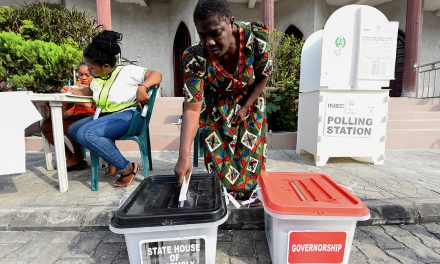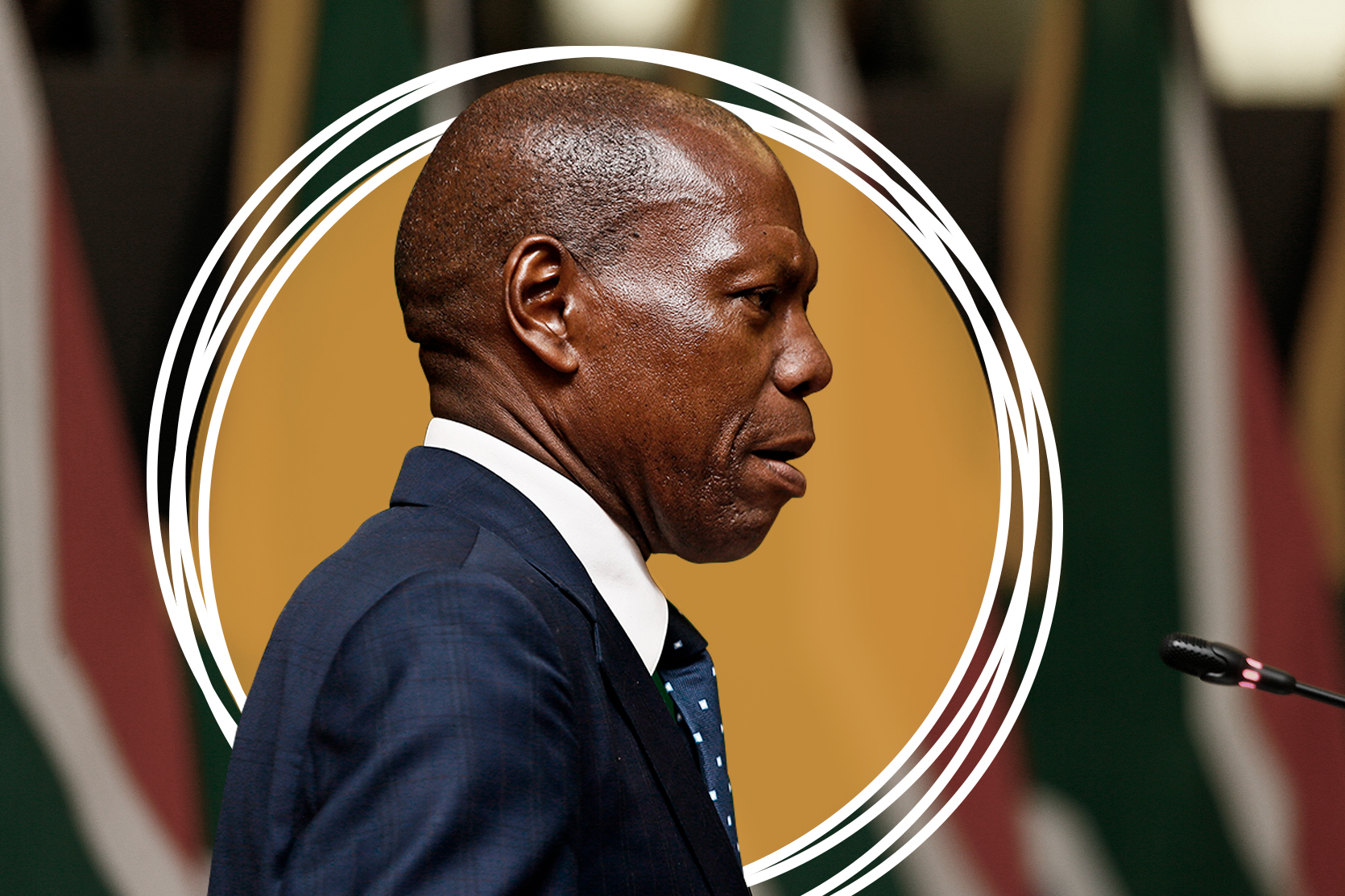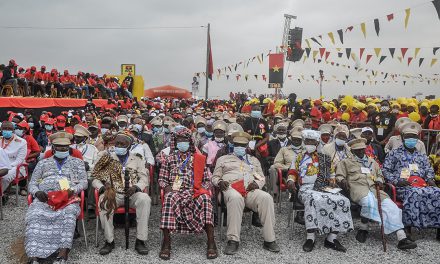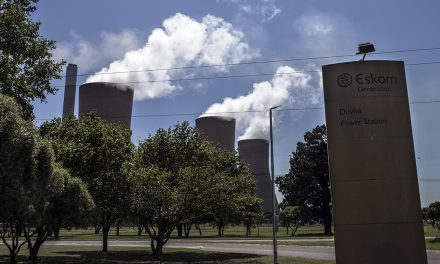The South African Public Protector, Advocate Busisiwe Mkhwebane, is doing an impressive job at protecting – her seat, that is, not the constitutional democracy. An impeachment enquiry is underway to establish whether there are grounds for her removal from office. However, the process has been heavily litigated, delayed and politicised.
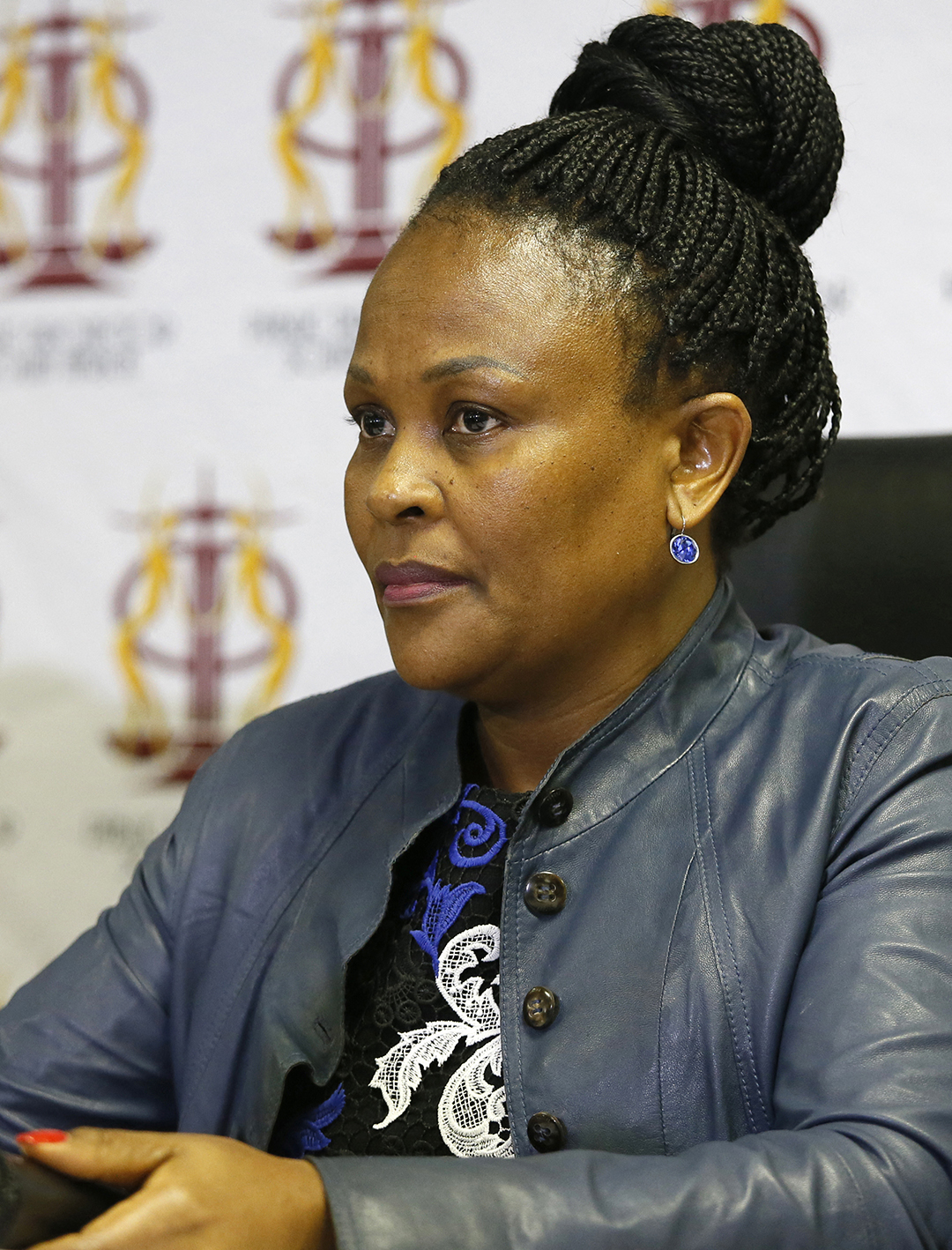
South Africa’s Public Protector Busisiwe Mkhwebane. Photo: Phill Magakoe/AFP
The role of the Public Protector
The Office of the Public Protector is one of the six constitutionally established ‘Chapter 9 institutions’, state institutions tasked with supporting constitutional democracy. These bodies form what could be understood as a kind of ‘integrity branch’ of government – an honorary fourth branch alongside the trias politica. This is because the bodies are entirely independent from the executive, legislative and judicial arms of government – they are impartial institutions, subject only to the Constitution and the law, which hold the other three branches of government accountable.
The Office of the Public Protector has the widest jurisdiction of the Chapter 9 institutions. The Public Protector acts as a government watchdog. Section 182 of the Constitution and the Public Protector Act[1] grant the Office the power to investigate, report on, and remedy any maladministration or corruption in state affairs or public administration. Various bodies across the political landscape can request the Public Protector to investigate a matter on the grounds laid out in section 6(4) of the Act.
The Public Protector is also entitled to investigate matters on these grounds of her own accord. Moreover, in the landmark case of Economic Freedom Fighters [EFF] v Speaker of the National Assembly, the Constitutional Court held that the findings of the Public Protector have a legally binding effect.[2] The court found that former President Jacob Zuma’s failure to implement the remedial action of the Public Protector was a violation of the Constitution.[3]
However, the binding effect of the Public Protector’s remedial action is not absolute; it depends on the nature of the particular matter in question. It is a wide power but “certainly not unfettered”.[4] A remedial action can only be considered legally binding when it is appropriate and practicable to effectively redress the complaint.
The potentially legally binding nature of the Public Protector’s decisions has important consequences for the institution. Implicated officials can no longer wish the Public Protector’s findings away. They are faced with two options: implement the remedial action or take the findings to court to have them reviewed and set aside. It is therefore vital to the institution’s legitimacy that the Public Protector’s decisions are procedurally and substantively defendable in terms of the Constitution and the law, as well as appropriate and practicable to appropriately redress the complaint.[5]
Institutional demise
The EFF judgment was handed down while the previous Public Protector, Advocate Thuli Madonsela, held office. Madonsela had taken a robust stance against corruption. Her renowned and far-reaching State of Capture report daringly exposed the systematic plundering of state coffers by former president Zuma and his business mogul cronies – the Gupta family. Yet, there was a concerted attempt by those implicated to undermine her authority. Public funds and unsavoury legal strategies were used in protracted litigation to avoid any meaningful compliance with Madonsela’s principled and legally defendable remedial actions.[6] This context would have influenced the decisions of the courts in their efforts to reinforce the powers of the Public Protector, and uphold the rule of law which was being systematically undermined by corrupt officials in power.[7]
However, the context today is considerably different. The respectable corruption-fighting reputation of the Office of the Public Protector has been demolished since Mkhwebane assumed office in 2016. The courts have invalidated her findings in a series of legal reviews launched against her investigative reports.[8] This time, however, the legal challenges were not spurious attempts by implicated leaders to evade accountability. Rather, they highlighted Mkhwebane’s incompetence and misconduct in the carrying out of her duties.
Incompetence
In 2018, the High Court set aside Mkhwebane’s report, which found that Absa was liable to pay R1.25 billion to the government. Her investigations were held to be procedurally unfair and unlawful, as she failed to engage with parties directly affected by her findings. Furthermore, her proposed remedial action to amend the Constitution significantly (and laughably) exceeded the powers entrusted to her by the Constitution and the Public Protector Act. She demonstrated a complete misunderstanding of the very foundation of South African law: the supremacy of the Constitution. This was a baffling decision by a legal professional heading an institution specifically tasked with supporting the constitutional democracy. The Constitutional Court confirmed this decision that she had exceeded her powers.[9]
In 2019, her report on the Gupta-linked Estina dairy farm project was reviewed and set aside in the High Court. Her investigation was found to be flawed – she failed to properly investigate the role of crucial senior African National Congress (ANC) leaders implicated in the scandal.[10] Her “failures and dereliction of duty” were considered as “gross negligence”, speaking to her failure to execute her duties in terms of the Constitution and the Public Protector Act.[11] The Constitutional Court upheld this ruling and dismissed Mkhwebane’s appeal application.
In 2020, the High Court reviewed and set aside Mkhwebane’s report finding that President Cyril Ramaphosa was obliged to disclose the funds donated to his “CR17” presidential campaign in 2017, and that he had misled Parliament regarding a payment made by Bosasa into a Ramaphosa-linked account.[12] Her decisions were found to be an “irrational and unlawful conclusion on the facts before her”, and she was held to have exceeded her authority in investigating the CR17 campaign at all.[13] The Constitutional Court, when confirming this decision, expressed concern over her “quality of reasoning”, finding that her conclusions were “devoid of any factual foundation”.[14]
In the same year, Mkhwebane’s report into the purported South African Revenue Service (SARS) High Risk Investigative Unit was reviewed and set aside by the High Court.[15] This unit was falsely accused of being “rogue” by the Sunday Times, and was subject to an infamous smear campaign in the media.[16] In fact, this High Risk Investigative Unit (HRIU) was a highly functional and lawfully established unit, saving South African taxpayers billions every year.[17] In a scathing judgment, Mkhwebane’s findings were held to be “without foundation” and based on “discredited reports and unsubstantiated facts”. The court held that her report was “the product of a wholly irrational process, bereft of any sound legal or factual basis” and which “fails at every point”. Furthermore, her report finding fault with the early retirement payout of former deputy commissions of SARS, Ivan Pillay, was invalidated by the High Court as irrational and a miscomprehension of the law.[18] The Constitutional Court denied Mkhwebane leave to appeal this ruling.
Misconduct
Mkhwebane’s incompetence is supplemented by her misconduct. Her time in office has been plagued by factional politics within the country’s leading party, the ANC. She has undertaken a dogged pursuit of current President Cyril Ramaphosa, and his staunch ally Pravin Gordhan (current Minister of Public Enterprises, and former head of SARS who oversaw the establishment of the HRIU), in an apparent witch-hunt to weaken Ramaphosa’s standing against his Zuma-devoted enemies within the party – members of the Radical Economic Transformation (RET) faction.[19] Members of this faction have publicly stated their support of Mkhwebane.
The courts are wary of her dubious intentions. In the Absa review case, the Constitutional Court found that Mkhwebane had acted in bad faith, misrepresented the facts, and put forward a number of falsehoods during litigation.[20] It confirmed the High Court’s finding that her investigatory process showed bias in favour of the government in the matter. Consequently, the court ordered punitive costs against Mkhwebane in her personal capacity. This was the first time such a ruling had been made against the Office of the Public Protector.
This was not the only unfortunate ‘first’ for Mkhwebane in this case. As a consequence of this ruling, she has also become the first head of a Chapter 9 institution to be criminally charged by the National Prosecuting Authority (NPA).[21] The NPA is proceeding with two perjury charges against her in relation to her alleged lies under oath in the Absa matter. This matter is still pending.
The court was most critical of her intentions in the SARS ‘rogue’ unit review, where it was held: “The Public Protector’s bias against Mr Gordhan and Mr Pillay is manifest. Having regard to the manner in which the Public Protector simply dismissed out of hand and completely ignored and irrationally discarded hard facts and clear evidence, it is clear that she approached her investigation with a preconceived notion, determined to make adverse findings against Minister Gordhan and Mr Pillay, thereby promoting the false rogue unit narrative.” The court ordered costs on a punitive scale for her “egregious” conduct, and asked that the judgment be handed to the Legal Practice Council in light of her “shockingly inappropriate and unwarranted” attack on a Pretoria High Court judge in a previous review matter. The Council has yet to decide whether Mkhwebane should be struck from the roll of advocates.
There is demonstrable evidence of Mkhwebane’s incompetence, and misconduct – in the form of bias and bad faith. These are clear grounds for her impeachment from office in terms of section 194(1)(a) of the Constitution.[22]
Impeachment enquiry
The Democratic Alliance (DA) first submitted a request for Mkhwebane’s removal in 2017, on the basis of the section 194 grounds of incompetence and misconduct, and on a number of occasions following this, but these attempts were unsuccessful.[23] The DA renewed its request for removal proceedings in Parliament after the 2019 elections. At this time, there were no parliamentary rules for the removal of the head of a Chapter 9 institution in terms of section 194 of the Constitution. In December 2019, the National Assembly unanimously adopted new parliamentary rules regulating the removal of Chapter 9 office bearers, outlining a 17-step impeachment process.
In early 2020, the DA submitted a motion to the Speaker of the National Assembly to initiate impeachment proceedings in terms of these rules. A preliminary independent panel was then appointed to determine whether there was a prima facie case for the removal of the Public Protector in terms of section 194(1)(a) of the Constitution – that being misconduct, incapacity, or incompetence. This panel was chaired by Justice Bess Nkabinde, who led two other Senior Counsel advocates. This panel gathered evidence and heard inputs, including some from Mkhwebane herself. It reported that there was substantial prima facie evidence of misconduct and incompetence, so recommended that Parliament form a committee to impeach her.[24] The National Assembly then considered this report and in March 2021 voted to adopt a resolution to proceed with the removal process. The Ad Hoc Committee for Section 194 Enquiry (S194 Committee) was established the following month. For the first time ever, an impeachment process for the head of a Chapter 9 institution was initiated in Parliament.
The National Assembly rules require that the S194 Committee conduct an enquiry to establish whether the charges are sustainable. The committee must then report back to Parliament with findings, reasons, and recommendations. If the committee recommends Mkhwebane’s removal, then the National Assembly must vote on whether to remove her. If two-thirds of the National Assembly vote in favour of the removal, the President must remove her in terms of section 194(3)(b) of the Constitution.
Impeachment delays: litigation
The S194 Committee planned to complete its work by January 2022. In response to external setbacks, this deadline was continually pushed back, and now the Committee has indicated that it will likely only complete its work in September this year.
The impeachment process has been no walk in the park. Nor should it be. Independence is core to the Public Protector’s purpose, and arbitrary removal would have disastrous consequences for the institutional legitimacy of this constitutional safeguard. This is why Parliament adopted an exhaustive 17-step removal process, with substantive and procedural fairness measures. However, Parliament’s attempts to impeach Mkhwebane can more aptly be described as a walk through a minefield. Mkhwebane has launched full legal combat in response to this constitutionally-approved process to impeach her.
While the independent panel was conducting its investigation, Mkhwebane applied to the High Court to challenge the constitutionality of the Parliamentary rules on 12 separate grounds.[25] She was successful on two of these grounds. The High Court found that the appointment of a judge to the independent panel breached the separation of powers and was unconstitutional, and that the limitation of her right to full legal representation was irrational, procedurally unfair, and thus unconstitutional.[26] This delayed the process, as it cast doubt on the lawfulness of Parliament’s impeachment process. Parliament halted its enquiry while it took this decision on appeal to the Constitutional Court.[27] The Constitutional Court held that it would not breach the separation of powers doctrine if a judge occupied a non-judicial role, as long as that role was not incompatible with their judicial office. However, the Court agreed with the High Court that the limitation of legal representation was irrational, procedurally unfair, and unconstitutional. So, the rules were changed to allow an incumbent appearing before the impeachment committee the right to full legal representation during the enquiry.
The S194 Committee resumed its work in February 2022, after a six month suspension of its processes pending the outcome of this litigation. Yet, despite the apex court’s unequivocal approval of the resumption of the impeachment process, Mkhwebane’s litigious vigour could not be quelled.
Since there can be no appeals of decisions of the apex court, Mkhwebane launched a rescission application in the Constitutional Court to set aside its own decision concerning the validity of the appointment of a judge to the panel. While this decision was pending, she launched two interdict applications in the High Court – one to interdict the S194 Committee from proceeding with its enquiry, and the other to interdict the President from exercising his section 194(3)(a) constitutional power to suspend her while the impeachment enquiry is in process. These applications are yet to be decided. As is tradition, her arguments are based on dubious legal grounds. She seems to treat the parliamentary process of impeachment and the presidential process of suspension as if they are interrelated. They are not.
The Constitutional Court recently dismissed her rescission application on the basis that it did not establish any rescindable errors, and that exceptional circumstances were required to warrant such an order, none of which existed.[28] In an unprecedented move, Mkhwebane applied for an order rescinding this rescission ruling. This means that she has asked the same set of judges, for a third time, to consider the same issue. This is an unfortunate novelty in South Africa’s legal history, which undermines the Constitutional Court’s authority.
In her second rescission application, Mkhwebane argued that it was unlawful for the court to have dismissed her application before the Chief Justice had concluded his investigation into the alleged leaking of information by Mr Ismail Abramjee. Mr Abramjee had sent an SMS to one of Parliament’s advocates claiming that he had it “on good authority” that the Court would decline to hear her rescission application. This insinuation of insider knowledge from the judiciary is concerning, and must be investigated. However, the circumstances of this correspondence are murky, and it is not enough to stall parliament’s impeachment enquiry, as Mkhwebane is trying to argue. Due to separation of powers, an alleged judicial leak via a vague SMS by a self-professed legal commentator should not impact a legally valid process of the legislative branch. Mkhwebane is simply clutching at straws in a last-ditch attempt to postpone the inevitable continuation of the impeachment proceedings.
Stalingrad strategies
The Public Protector has adopted the Stalingrad legal defence strategy – an approach baptised by Zuma. The term was coined by Zuma’s senior counsel to describe their counterattack to the charges of corruption, racketeering, fraud, and money laundering. Like the relentless and tactical urban warfare between the Russians and the Germans in Stalingrad during World War II, this legal strategy wears down the opposition and the judicial process by appealing every single ruling unfavourable to the defendant, and by using whatever means possible to delay justice. Although Mkhwebane’s spokesperson insists her legal challenges are “for the interests of the office’s mandate”,[29] her tactics demonstrate a war of attrition by someone who lacks any meritorious case.
Mkhwebane’s strategy is to string out the litigation around her impeachment, attempting to stall the process until the expiry of her non-renewable seven-year term in October 2023. The impeachment process has been slow, with time needing to be spent on the adoption of the Parliamentary rules, and the six-month hiatus resulting from the Mkhwebane’s challenge to these rules. Luckily, both the judiciary and the legislature remain steadfast in their commitment to forge ahead with the constitutional processes to hold her accountable by the end of this year at the latest. The Constitutional Court has refused to hear an ill-conceived second rescission application, and the S194 Committee has repeatedly maintained that there is no legal impediment to the continuation of their process.[30] However, time is running out. Any more delays could deprive Parliament of the opportunity to hold her accountable before the end of her term.
Mkhwebane’s tactics are well-aligned with other suspects of corruption in government, especially in the wake of the recent reports from the South African Commission of Inquiry into Allegations of State Capture. Political warfare is increasingly being waged in the South African courts, and when Stalingrad tactics are employed, it perilously undermines the authority of the judiciary, the Constitution, and the rule of law.
Partisan divides
Just like her investigations and reports, Mkhwebane’s impeachment enquiry has become politicised and thus subject to controversy. While most Members of Parliament (MPs) from across the political spectrum in the S194 Committee have agreed that there is no legal impediment to the continuation of their enquiry, MPs from the EFF and African Transformation Movement (ATM) insisted that the continuation of impeachment proceedings was premature, given the pending matters in court, as well as a subversion of the sub judice rule.[31] These arguments confuse the law (which is simple) with politics (which appears to be highly complicated).
This has demonstrated that the ultimate impeachment vote could occur along polarised partisan lines, rather than considerations of incompetence and misconduct. This would be disappointing. As per United Democratic Movement v Speaker,[32] MPs are obliged to be obedient to the Constitution, and faithful to the electorate of South Africa. They are constitutionally required to vote with their conscience, not their partisan interests.
Consequences for the Office
Mkhwebane’s incompetence, bias, and Stalingrad legal tactics have had devastating effects on the Office of the Public Protector. After two unremarkable first Public Protectors – one which did nothing worthy of mention, and the other protecting ANC members from accountability[33] – Mkhwebane’s predecessor, Advocate Thuli Madonsela, finally elevated the institution to the constitutional status it was envisioned to have. Under her leadership, it gained a reputation for being independent, impartial, procedurally and substantively fair in its investigations, a fierce protector of the Constitution and the rule of law, and a bulwark against corruption. Mkhwebane has backtracked on these successes, turning the institution into a political tool and generally untrustworthy operator of the law. The moral and intellectual legitimacy of this powerful body has been lost in the eyes of the public.
Mkhwebane’s Stalingrad legal tactics have not only drained the office’s budget and taxpayer money for her seemingly personal or political agenda, as well as distracted the Public Protector from the meaningful watchdog work that she should be doing, but they have also sent a dangerous message to other heads of office abusing their powers. If her term ends before the impeachment enquiry is completed, Parliament will no longer have the power to hold her accountable. This does not mean she will escape accountability entirely. As mentioned above, the NPA is pursuing criminal charges of perjury against her, and the Constitutional Court has referred her to the Legal Practice Council. However, if Mkhwebane manages to delay the process to such an extent that she escapes impeachment, she indicates that the Constitution’s accountability mechanisms can be subverted. Consequently, the legitimacy of South Africa’s separation of powers apparatus is at stake.
Note: We have retained the use of the less formal “enquiry”, as used in the formal name of the commission.
[1] 23 of 1994.
[2] EFF v Speaker of the National Assembly 2018 (3) BCLR 259 (CC). In the subsequent case of President of South Africa v Office of the Public Protector 2018 (2) SA 100 (GP) para 85, the High Court held that if the Public Protector’s decisions could never be binding, her constitutional power to “take remedial action” would be rendered largely meaningless or ineffectual.
[3] Specifically, section 83(b) read with sections 181(3) and 182(1)(c) of the Constitution.
[4] EFF supra note 2 para 71.
[5] K Govender and P Swanepoel “The Power of the Office of the Public Protector and the South African Human Rights Commission: A Critical Analysis of SABC v DA and EFF v Speaker of the National Assembly” PER/PELJ 2020 (23) – DOI http://dx.doi.org/10.17159/1727- 3781/2020/v23i0a6249.
[6] Govender and Swanepoel op cit note 5 at 23.
[7] Michelle le Roux and Dennis Davis Lawfare: Judging Politics in South Africa (Johannesburg: Jonathan Ball Publishers, 2019), 286.
[8] https://ewn.co.za/2020/12/21/reviewed-8-legal-challenges-that-overturned-mkhwebane-s-reports-and-findings.
[9] Public Protector v South African Reserve Bank 2019 (9) BCLR 1113 (CC).
[10] Mkhwebane failed to investigate the role of senior leaders like Ace Magashule and Mosebenzi Zwane, who were at the centre of the R220 million project. Zwane went on to become the Minister of Mineral resources from 2015-2018 – a Zuma appointment steeped in controversy.
[11] Democratic Alliance v Public Protector; Council for Advancement of the South African Constitution v Public Protector [2019] 4 All SA 79 (GP) para 25.
[12] The issue of transparency in internal political-party financing is an important democratic matter that needs to be sufficiently dealt with. See: https://hsf.org.za/publications/hsf-briefs/what-cr17-teaches-us-the-need-to-know-who-donates-to-politicians-internal-party-campaigns; https://mg.co.za/article/2017-09-29-00-court-rules-that-voters-must-know-who-funds-parties/.
[13] The President of the Republic of South Africa v The Public Protector (The Information Regulator Amicus Curiae) 2020 JDR 0406 (GP) para 75.
[14] Public Protector v President of the Republic of South Africa 2021 (6) SA 37 (CC).
[15] Gordhan v The Public Protector 2020 JDR 2741 (GP).
[16] https://www.dailymaverick.co.za/article/2020-12-08-public-protector-rogue-unit-how-a-big-lie-became-a-bigger-and-bigger-lie/; https://www.dailymaverick.co.za/article/2016-04-03-house-of-cards-what-does-the-sunday-times-apology-mean-for-the-rest-of-the-pack/.
[17] See Kristen van der Zee, Corné van Walbeek and Sibahle Magadla ‘Illicit/cheap cigarettes in South Africa’ (2020) 23 Trends in Organised Crime 242.
[18] Gordhan v Office of the Public Protector 2021 JDR 0054 (GP).
[19] https://mg.co.za/politics/2021-03-23-ret-is-a-splinter-party-established-in-magashules-office-says-anc-ec-secretary/
[20] https://ewn.co.za/2019/07/22/sarb-absa-report-5-main-findings-concourt-made-against-mkhwebane ; https://www.concourt.org.za/index.php/judgement/329-public-protector-v-south-african-reserve-bank-cct107-18
[21] https://www.dailymaverick.co.za/article/2022-02-28-npa-to-prosecute-busisiwe-mkhwebane-on-two-counts-of-perjury-for-sa-reserve-bank-report/#:~:text=Mkhwebane%20will%20become%20the%20first,the%20three%20charges%20was%20withdrawn.
[22] According to this section, the Public Protector may be removed from office only on the ground of misconduct, incapacity or incompetence. In Mkhwebane’s case, incapacity is irrelevant.
[23] They were either voted against (2017), lapsed (2018), or withdrawn (2019).
[24] https://www.parliament.gov.za/report-independent-panel-public-protector.
[25] Public Protector v Speaker of the National Assembly 2020 (12) BCLR 1491 (WCC).
[26] Public Protector v Speaker supra paras 64 and 65.
[27] Speaker of the National Assembly v Public Protector 2022 (3) SA 1 (CC).
[28] https://mg.co.za/news/2022-05-06-concourt-dismisses-mkhwebanes-rescission-application/.
[29] https://www.dailymaverick.co.za/article/2021-10-03-the-public-protector-does-not-waste-taxpayers-money-we-respond-to-legal-action-against-us/.
[30] https://www.businesslive.co.za/bd/national/2022-03-29-parliamentary-inquiry-into-mkhwebane-proceeds-despite-warning-of-interdict/.
[31] According to the sub judice rule, Parliament may not discuss the merits of a case that is the subject of pending or ongoing court proceedings. Continuing its investigations into Mkhwebane’s fitness to hold office would in no way impact the legal issues before the courts in the rescission or interdict matters – arguments which are legally precarious at best. Furthermore, in EFF v Speaker the Constitutional Court stressed that the National Assembly “must be left to enjoy its constitutionally guaranteed functional independence to determine its own procedures or processes”. The sub judice rule cannot be used to override this – Parliament’s process would in no way usurp the jurisdiction of the courts. This rule has a long history of being abused in South Africa by politicians seeking to avoid accountability.
[32] 2017 (8) BCLR 1061 (CC).
[33] Selby Baqwa and Lawrence Mushwana respectively.
[activecampaign form=1]
Helen Acton is a legal analyst at GGA. She holds a Bachelor’s degree in Politics and Philosophy, and an LLB from the University of Cape Town. She is interested in analysing political issues from a legal perspective. Constitutional and administrative law are her primary interests, especially the role they can play in promoting socio-economic equality and improving governance performance.


